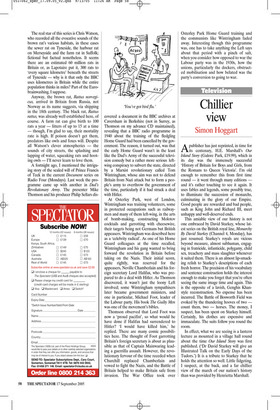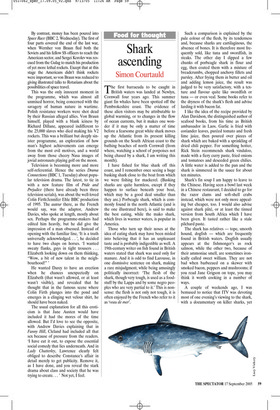Chillier view
Simon Hoggart
Apublisher has just reprinted, in time for its centenary, H.E. Marshall’s Our Island Story (Galore Park, £19.99), which in its day was the immensely successful ‘History of Britain for Boys and Girls, from the Romans to Queen Victoria’. I’m old enough to remember this from first time round — it went through many editions and it’s rather touching to see it again. It uses fables and legends, some possibly true, to illuminate the succession of monarchs, culminating in the glory of our Empire. Good people are rewarded and bad people, such as King John and Richard III, meet unhappy and well-deserved ends.
This amiable view of our history is not one embraced by David Starkey, whose latest series on the British royal line, Monarchy By David Starkey (Channel 4, Monday), has just resumed. Starkey’s royals are vicious beyond measure, almost subhuman, engaging in fratricide, infanticide, polygamy, child sex, treachery and mass slaughter whenever it suited them. There is an almost lip-smacking relish to Starkey’s descriptions of each fresh horror. The precision of his vocabulary and sentence construction holds the interest enough to make you forget that you’re often seeing the same image time and again. This is the opposite of a lavish, Genghis Khanstyle reconstruction. No expense has been incurred. The Battle of Bosworth Field was evoked by the thundering hooves of two count them, two — horses. The money, I suspect, has been spent on Starkey himself. Certainly, his clothes are expensive and immaculate. The suits follow you round the room.
In effect, what we are seeing is a lantern lecture as mounted in a village hall round about the time Our Island Story was first published. (‘Dr David Starkey will give an Illustrated Talk on the Early Days of the Tudors.’) It is a tribute to Starkey that he holds the attention so well. Little fidgeting, I suspect, at the back, and a far chillier view of the march of our nation’s history than was provided by Henrietta Marshall. By contrast, money has been poured into Space Race (BBC 2, Wednesday). The first of four parts covered the end of the last war, when Wernher von Braun fled both the Soviets and his fellow SS officers to reach the American sector, and Sergei Korolev was rescued from the Gulag to match his production of yet more lethal rockets. Except that at this stage the Americans didn’t think rockets were important, so von Braun was reduced to giving illustrated talks to Rotarians about the possibilities of space travel.
This was the only innocent moment in the programme, which was almost all unmixed horror, being concerned with the savagery of human nature in wartime. Polish resistance workers were shot dead by their Russian alleged allies. Von Braun himself, played with a blank iciness by Richard Dillane, appeared indifferent to the 25,000 slaves who died making his V2 rockets. This was a brilliant but deeply sinister programme, an exploration of how man’s highest achievements can emerge from the most evil motives, and a world away from those cheery Nasa images of jovial astronauts playing golf on the moon.
Television is becoming more and more self-referential. Hence the series Drama Connections (BBC 1, Tuesday) about popular television drama. The latest, to tie in with a new feature film of Pride and Prejudice (there have already been three television serials), was about the well-loved Colin Firth/Jennifer Ehle BBC production of 1995. The auteur there, as the French would say, was the adaptor, Andrew Davies, who spoke at length, mostly about sex. Perhaps the programme-makers had edited him heavily, but he did give the impression of a man obsessed. Instead of opening with the familiar line, ‘It is a truth universally acknowledged... ’, he decided to have two chaps on horses. ‘I wanted sweaty flanks, guys in tight trousers ... Elizabeth looking down on them thinking, “Wow, a bit of new talent in the neighbourhood!” ’ He wanted Darcy to have an erection when he chances unexpectedly on Elizabeth (that wasn’t allowed, or at least wasn’t visible), and revealed that he thought that in the famous scene where Colin Firth plunges into the pond and emerges in a clinging wet velour shirt, he should have been naked.
The usual explanation for all this eroticism is that Jane Austen would have included it had the mores of the time allowed. But I’d love to see the opposite, with Andrew Davies explaining that in Fanny Hill, Cleland had included all that sex because of pressure from the readers. ‘I have cut it out, to expose the essential social comedy that lies underneath. And in Lady Chatterley, Lawrence clearly felt obliged to describe Constance’s affair in detail merely to get publicity. Remove it, as I have done, and you reveal the stark drama about class and society that he was trying to create... ’ Not yet, I feel.




















































 Previous page
Previous page